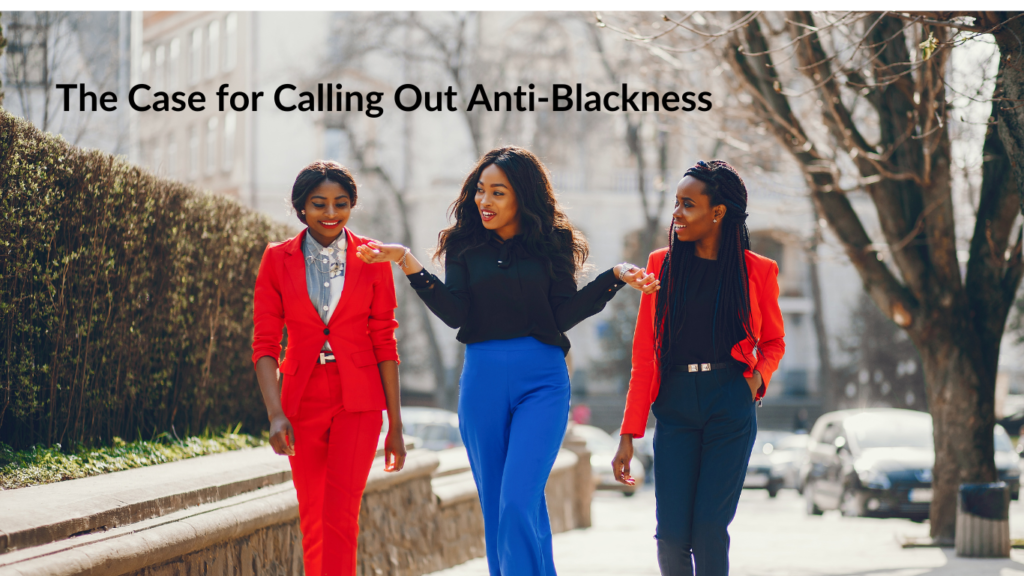

The Case for Calling Out Anti-Blackness
A couple of months ago, a popular UK podcast called Shxtsngigs (SNG) went on an American tour to promote their show. Hosted by two black men named James & Fuhad, this British podcast is very popular in the States. The tour took a stop on a podcast called Flagrant and clips from that interview went viral this past week for comments that the Flagrant host, Andrew Schulz, made about black women. He had not heard of a popular trending topic called the black wife effect where non-black men marry black women and show their before/after photos of the vast improvement the black woman has made to their life. Schulz’s initial reaction upon hearing about the black wife effect was to disregard it and presume these men were under duress.
Schulz’s commentary was the breeding ground for disrespect to black women. But it was James and Fuhad’s reaction that caused the interview to go viral. The criticism they received was that they should not have been laughing at the jokes about black women but instead should have spoken up and put the host in check.
Here is where it gets murky. Schulz defended his comments by pointing out that he is a stand-up comedian and everything he said was merely a joke. After the fallout from that interview, he and his co-hosts spoke about the incident disregarding any claims that what he said was inappropriate. I kept thinking, am I being gaslit?
I rarely ask that question because as many therapists will tell you, we as a society misuse the term often. So, for this instance, is it gaslighting? Merriam-Webster’s definition of gaslighting is “psychological manipulation of a person usually over an extended period of time that causes the victim to question the validity of their own thoughts, perception of reality, or memories and typically leads to confusion, loss of confidence and self-esteem, uncertainty of one’s emotional or mental stability, and a dependency on the perpetrator.”
And now I understand the murkiness. The victim/target in this instance was not present for this interview. What started as a compliment being given to black women in reference to the black wife effect, Schulz instead changed the narrative to depict black women as angry and scary. The questions of gaslighting come into play as many black women were offended only to be told that they were just jokes. But there is such a thing as a joke going too far. Don’t use stereotypes and tropes to make jokes at our expense. Surely, there are more creative ways to be funny.
That wasn’t the only comment; many things were said. Here are just a few necessary responses:
1. The part where people argue that he was just telling a joke. And that’s the subterfuge of comedy—you can say whatever you want as long as you make it a joke. Growing up, the motto we were taught was, “sticks and stones may break your bones, but names can never hurt you.” But sometimes they do. Sometimes people have mental and/or emotional struggles that get internally activated through external stimuli. One example of said stimulus is a joke. I, as a black woman, am particularly sensitive to narratives that paint black women as scary or difficult as if we corner the market on those traits. Joke or not, I am not a fan of perpetuating that narrative. So, you feel free to tell your little jokie-jokes and I’ll feel free to tell you it’s not funny.
2. The part where black men don’t have to protect black women from a joke.
One of the Flagrant co-hosts (who is neither black nor a woman) chose to say, “Black female friends don’t feel bad about this.” I hope he went back and read the comments because all I saw was black woman after black woman talking about how offensive the segment was. If any comment classifies as gaslighting, it’s this one: pretending that what has been said does not exist.
3. The part where he said that SNG’s real community doesn’t have a problem with the interview. Schulz kept talking about SNG’s community as if it’s their fan base. In reality, there were two communities at play: there’s a small c community (fans) and a large C community (the black diaspora). Schulz does not understand the latter so from his purview, the two camps are: fans and haters. And what do you do with a hater? You disregard anything they say, and that is what he has chosen to do with all the people who were offended.
Even if this incident is not a textbook example of gaslighting, it does serve as a textbook way of how to respond to anti-blackness. Call it out. Every time. It may seem fruitless like calling out into a void, but there is still purpose. We speak up and call things as they are. And when we don’t get it right the first time, like SNG in that interview, we do better next time.
This blog was also originally posted in my monthly column with the Sac Observer. Go there to check out more columns or to explore their award-winning journalism.
